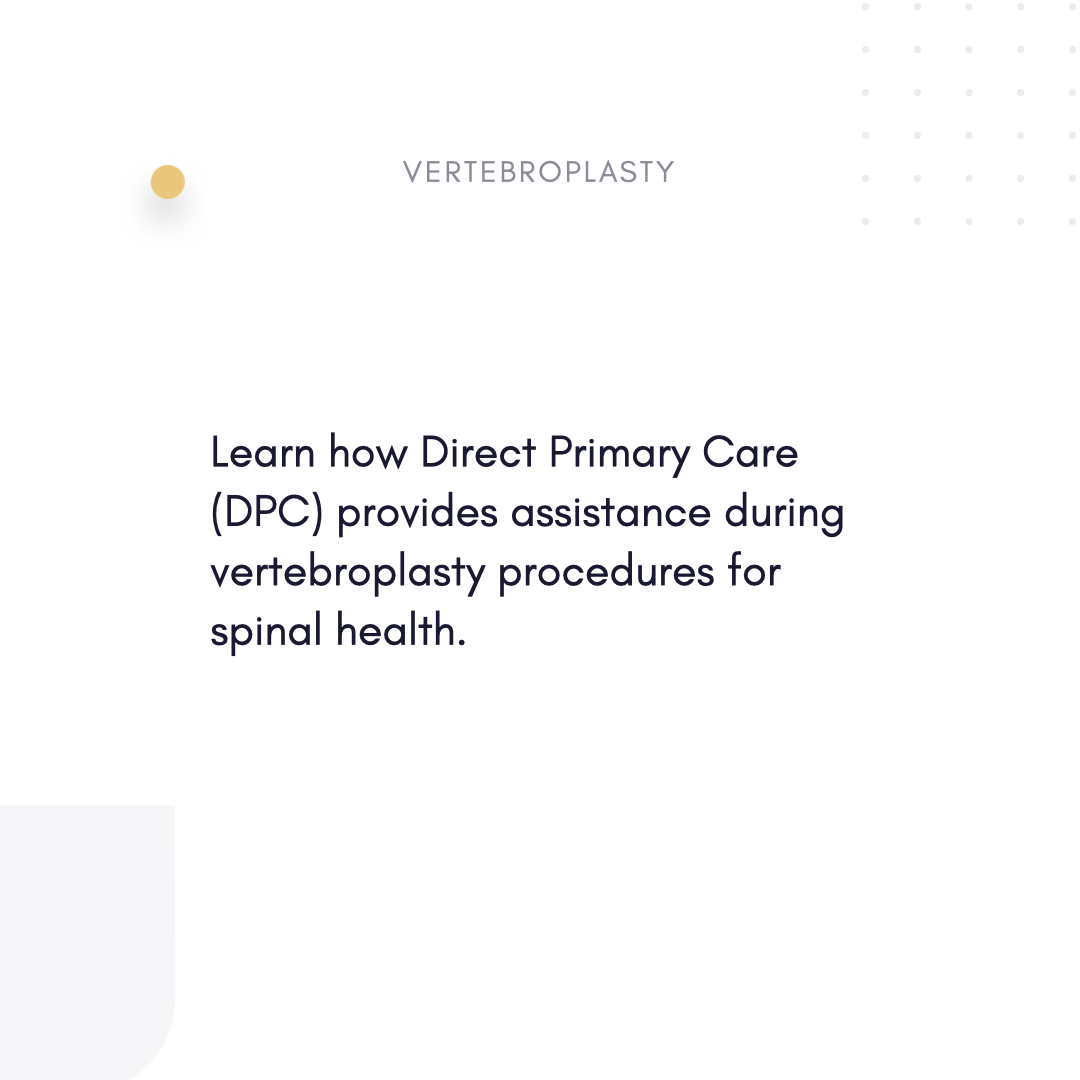Vertebroplasty and Direct Primary Care (DPC): Stability, Support, Personalized Care
If a spinal fracture causes severe pain, vertebroplasty stabilizes the bone. DPC makes sure that your procedure is planned, affordable, and fits your recovery needs.

What is vertebroplasty? It is a way to fix broken bones in the spine.
Vertebroplasty puts bone cement into broken vertebrae. Important information:
- Uses: Treats compression fractures caused by osteoporosis or trauma.
- Procedure: Not very invasive; takes 30 to 60 minutes with local anesthesia.
- Safety: 90% pain relief; less than 5% chance of cement leaking.
Important information:
- Costs: DPC memberships (150–400 USD/month) include consultations and follow-ups, while traditional fees (10,000–20,000 USD/procedure) do not.
Risks of waiting:
- Long-term pain, kyphosis, and loss of movement.
How DPC Improves the Results of Vertebroplasty
Direct Primary Care (DPC) changes how spinal care is done by putting patients first and coordinating care ahead of time.
All-encompassing Before the Procedure Preparation
- Fast diagnostics: Make an appointment for an MRI or CT scan within 48 hours to confirm the fracture.
- Improving bone health: Give bisphosphonates or calcium and vitamin D.
- Pain management: If necessary, lower the dose of opioids before the procedure.
Prices that are clear and support that is complete
- Care that covers everything: Membership includes sending patients to a radiologist, getting images, and physical therapy after surgery.
- Saving money: Self-pay DPC rates can help you save 25–45% on facility fees.
- To avoid falls, suggest changes to the home that make it safer and exercises that improve balance.
Personalized Recovery and Long-Term Health
- 24/7 access: Take care of any back pain or numbness right away after the procedure.
- Coordination of rehab: Use telehealth to show people how to do core-strengthening exercises.
- Bone monitoring: Get DEXA scans every year to keep an eye on osteoporosis.
Advantages of DPC for Vertebroplasty Patients
- No wait times: 90% of DPC patients have the procedure done within a week, while it usually takes three or more weeks.
- Continuity: One group takes care of pain management, physical therapy, and osteoporosis.
- No extra costs: Prices that are clear (for example, 8,500 USD all-inclusive for a single level).
Success Stories from Real Life
- Case 1: Maria, 72, has a broken L1 vertebra. Maria's DPC team did vertebroplasty, which made her pain go from 9/10 to 2/10 in 24 hours.
- Case 2: James, 65, had a T12 fracture after an accident. James's DPC provider did both vertebroplasty and physical therapy, and he was able to start gardening again in four weeks.
Questions and Answers: DPC Vertebroplasty
- Q: How long will it take for me to walk again?
- A: Right away—putting weight on it is good; don't lift heavy things for six weeks.
- Q: Will cement cause problems in the long run?
- A: Not often—DPC checks for nearby fractures once a year with imaging.
- Q: Is it possible for fractures to happen again?
- A: Yes. DPC gives medicines to make bones stronger and ways to avoid falling.
- Q: What if the pain doesn't go away?
- A: DPC looks into kyphoplasty or surgery as options.
Why DPC is the Best Place for Spinal Care
The American Academy of Orthopaedic Surgeons (AAOS) stresses the importance of managing osteoporosis. DPC gets things done by:
- Lessening complications: Pre-op optimization cuts down on nearby fractures by 30%.
- Increasing adherence: 90% of people finish PT compared to 60% of people in the U.S.
- Saving money: Members save between 5,000 USD and 15,000 USD by using bundled pricing.
Final Thoughts
DPC vertebroplasty isn't just about cement; it's about full care that strengthens your spine. With DPC, you can skip referral delays, see the best specialists, and get a recovery plan that works with your life. From broken bones to full function, get care that's as strong as your new backbone.






